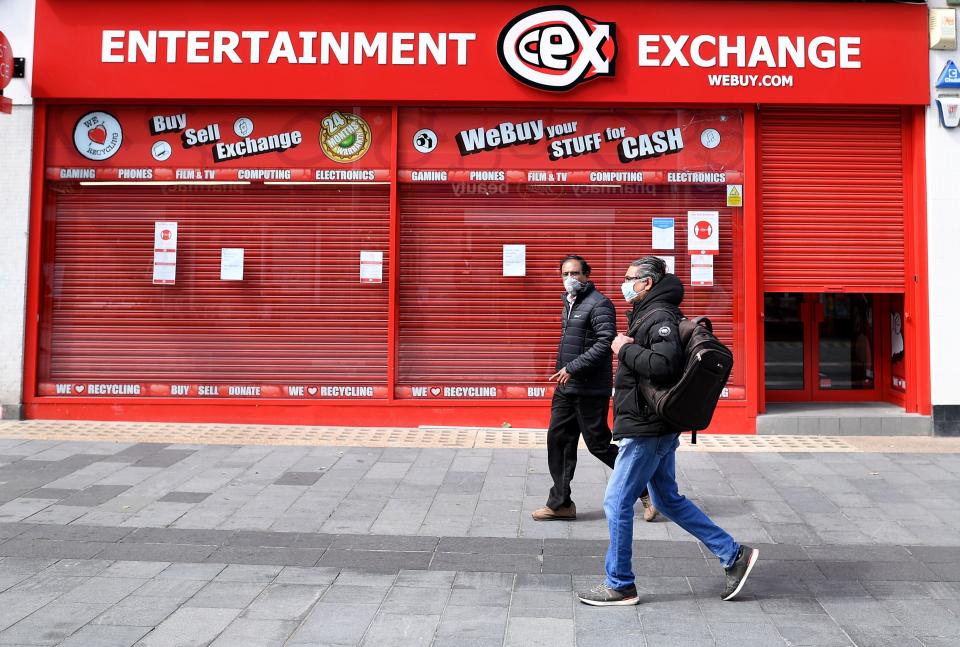Boris Johnson warns UK faces 'a real, real crisis' on economy

UK prime minister Boris Johnson has admitted the UK faces a worse economic crash than the financial crisis of 2008 as a result of the COVID-19 pandemic and subsequent lockdown.
“We all knew, when we went into lockdown, that there would be huge economic cost,” Johnson said on Tuesday.
The prime minister said the 2008 crisis, which saw the economy shrink by 6%, “was actually not as bad” as the current situation.
“Of course we face a real, real crisis and we have to deal with it,” he said. “But we’re going to deal with it in the most energetic way possible.”
New figures from the Treasury show that 9.3 million people are now on furlough, almost a third of the UK’s total workforce. Fears are growing that many will lose their jobs when the scheme ends in October.
READ MORE: Furlough number hits 9.3 million days before cut off
Speaking on Tuesday, Johnson refused to say whether the government’s job retention scheme will be extended but hinted that chancellor Rishi Sunak would announce more measures on jobs next week.
The prime minister would not be drawn on the possibility of regional support for areas like Leicester, which has been forced to extend its lockdown in response to a local outbreak of COVID-19.

It came as the prime minister delivered a speech in Dudley on Tuesday setting out plans to jump-start the UK’s ailing economy. Johnson pledged to “build, build, build” with £5bn ($6.1bn) of spending on infrastructure projects brought forward.
“We will not be responding to this crisis with what some people call austerity,” he said. “The world has moved on since 2008.”
Flagship measures include £1bn to build new schools and £1.5bn to repair hospitals. Johnson announced a new taskforce, dubbed “Project Speed”, that will “scythe through red tape and get things done”. He also promised the most “radical reforms of our planning system since the Second World War” to encourage housebuilding.
Other commitments include a new National Science Funding Agency that will back “high risk, high reward” projects.
READ MORE: UK government promises £5bn 'New Deal' to kickstart recovery
“I fully accept that there are going to be economic aftershocks but there are also big opportunities to take this country forward,” Johnson said.
“We need pace and this is the moment to inject that pace into the ambitions of the government.”
The spending pledges came hours after official data showed the UK economy suffered its steepest decline in output in 40 years. GDP shrank by 2.2% in the first quarter of 2020, before the full effects of lockdown were even felt.
“We must work fast,” Johnson said. “We’ve already seen the vertiginous drop in GDP and we know that people are worried now, about their jobs and their businesses.
“We’re waiting, as if between the flash of lighting and the thunderclap, with our hearts in our mouths, for the full economic reverberations to appear. We must use this moment now, this interval, to plan our response.”

Business groups welcomed the government’s plans and urged it to act quickly.
“The key now is to ensure that these projects get off the ground as a matter of urgency so that the benefits flow down through supply chains, safeguarding and creating as many jobs as possible across all UK regions,” said Stephen Phipson, chief executive of manufacturers group Make UK.
READ MORE: UK economy suffered biggest fall since 1979 as pandemic struck
Adam Marshall, director general of the British Chamber of Commerce, said: “The infrastructure delivery plans announced by the prime minister are welcome, but they must take shape on the ground swiftly to give a real confidence boost to businesses and communities.
“The government must go even further over the coming days to rekindle business and consumer confidence, as part of a wider roadmap to economic recovery. This is a critical moment, and business communities need this government to be bolder than any previous government has ever been.”

 Yahoo Finance
Yahoo Finance 